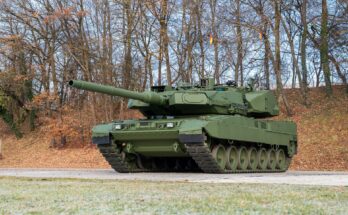Afghanistan’s Air Force will receive billions of dollars of new investments in the next few years.
Speaking on September 3, 2017, Afghan President Ashraf Ghani said that $6 billion would be spent over the next four years to strengthen the Air Force. He made the comments after meeting with NATO officials to discuss the Resolute Support mission.
U.S. General Phillip A. Stewart, who is the commander of the Train, Advise, Assist Command, gave a slightly different figure in an interview with TOLOnews, saying that $7 billion will be spent over a four year period.
He said, “We expect the Afghan Air Force to be fully professional, sustainable and capable and independent and that’s our whole goal here.”
General Stewart added,
It takes a lot of time to build an air force from scratch, the Afghan Air Force is actually doing it incredibly fast and doing it under combat conditions, I don’t think that’s ever being done before when you an air force from scratch and in combat conditions, I think the international community has pitched in in an incredible manner, we have fourteen different nations that are part of the train, advise and assist mission.
Over the next four years, the number of aircraft in Afghanistan’s inventory will be doubled under the program. The reports did not specify what aircraft the military would be receiving moving forward, though the U.S. announced earlier this year it would transfer well over 100 Black Hawk helicopters to the Afghan Air Force.
Afghanistan has received a dozen A-29 Super Tucanos, out of an order for 20, and a number of armed MD 530F helicopters to assist in military operations.
On September 1, 2017, the U.S. Department of Defense awarded Orbital ATK a $69.4 million contract “for the Afghanistan Air Force AC-208 armed intelligence surveillance and reconnaissance aircraft requirement,” confirming that the country will be receiving the AC-208, an armed version of the turboprop aircraft. The contract will be completed by November 30, 2018.
Afghanistan will utilize its new aircraft to support missions against both the Taliban and a local Islamic State affiliate. The Taliban, in particular, have made significant inroads against the Afghan government. Last month, U.S. President Donald Trump pledged to continue the U.S. war effort in Afghanistan and reverse the process of withdrawing troops.
Military markets analyst, covering Eurasia, Middle East, and Africa.
- Derek Bisaccio
- Derek Bisaccio
- Derek Bisaccio
- Derek Bisaccio
- Derek Bisaccio
- Derek Bisaccio
- Derek Bisaccio
- Derek Bisaccio
- Derek Bisaccio
- Derek Bisaccio
- Derek Bisaccio
- Derek Bisaccio
- Derek Bisaccio
- Derek Bisaccio
- Derek Bisaccio
- Derek Bisaccio
- Derek Bisaccio
- Derek Bisaccio
- Derek Bisaccio
- Derek Bisaccio
- Derek Bisaccio
- Derek Bisaccio
- Derek Bisaccio
- Derek Bisaccio
- Derek Bisaccio
- Derek Bisaccio
- Derek Bisaccio
- Derek Bisaccio
- Derek Bisaccio
- Derek Bisaccio
- Derek Bisaccio
- Derek Bisaccio
- Derek Bisaccio
- Derek Bisaccio
- Derek Bisaccio
- Derek Bisaccio
- Derek Bisaccio
- Derek Bisaccio
- Derek Bisaccio
- Derek Bisaccio
- Derek Bisaccio
- Derek Bisaccio
- Derek Bisaccio
- Derek Bisaccio
- Derek Bisaccio
- Derek Bisaccio
- Derek Bisaccio
- Derek Bisaccio
- Derek Bisaccio
- Derek Bisaccio
- Derek Bisaccio
- Derek Bisaccio
- Derek Bisaccio
- Derek Bisaccio
- Derek Bisaccio
- Derek Bisaccio
- Derek Bisaccio
- Derek Bisaccio
- Derek Bisaccio
- Derek Bisaccio
- Derek Bisaccio
- Derek Bisaccio
- Derek Bisaccio
- Derek Bisaccio
- Derek Bisaccio
- Derek Bisaccio
- Derek Bisaccio
- Derek Bisaccio
- Derek Bisaccio
- Derek Bisaccio
- Derek Bisaccio
- Derek Bisaccio
- Derek Bisaccio
- Derek Bisaccio
- Derek Bisaccio
- Derek Bisaccio
- Derek Bisaccio
- Derek Bisaccio
- Derek Bisaccio
- Derek Bisaccio
- Derek Bisaccio
- Derek Bisaccio
- Derek Bisaccio
- Derek Bisaccio
- Derek Bisaccio
- Derek Bisaccio
- Derek Bisaccio
- Derek Bisaccio
- Derek Bisaccio
- Derek Bisaccio
- Derek Bisaccio
- Derek Bisaccio
- Derek Bisaccio
- Derek Bisaccio
- Derek Bisaccio
- Derek Bisaccio
- Derek Bisaccio
- Derek Bisaccio
- Derek Bisaccio
- Derek Bisaccio
- Derek Bisaccio
- Derek Bisaccio
- Derek Bisaccio
- Derek Bisaccio
- Derek Bisaccio
- Derek Bisaccio
- Derek Bisaccio
- Derek Bisaccio
- Derek Bisaccio
- Derek Bisaccio
- Derek Bisaccio
- Derek Bisaccio
- Derek Bisaccio
- Derek Bisaccio
- Derek Bisaccio
- Derek Bisaccio
- Derek Bisaccio
- Derek Bisaccio
- Derek Bisaccio
- Derek Bisaccio
- Derek Bisaccio
- Derek Bisaccio
- Derek Bisaccio
- Derek Bisaccio
- Derek Bisaccio
- Derek Bisaccio
- Derek Bisaccio
- Derek Bisaccio
- Derek Bisaccio
- Derek Bisaccio
- Derek Bisaccio
- Derek Bisaccio
- Derek Bisaccio
- Derek Bisaccio
- Derek Bisaccio
- Derek Bisaccio
- Derek Bisaccio
- Derek Bisaccio
- Derek Bisaccio
- Derek Bisaccio
- Derek Bisaccio
- Derek Bisaccio
- Derek Bisaccio
- Derek Bisaccio
- Derek Bisaccio
- Derek Bisaccio
- Derek Bisaccio
- Derek Bisaccio
- Derek Bisaccio
- Derek Bisaccio
- Derek Bisaccio
- Derek Bisaccio
- Derek Bisaccio
- Derek Bisaccio
- Derek Bisaccio
- Derek Bisaccio
- Derek Bisaccio
- Derek Bisaccio
- Derek Bisaccio
- Derek Bisaccio
- Derek Bisaccio
- Derek Bisaccio
- Derek Bisaccio
- Derek Bisaccio
- Derek Bisaccio
- Derek Bisaccio
- Derek Bisaccio
- Derek Bisaccio
- Derek Bisaccio
- Derek Bisaccio
- Derek Bisaccio
- Derek Bisaccio
- Derek Bisaccio
- Derek Bisaccio
- Derek Bisaccio
- Derek Bisaccio
- Derek Bisaccio
- Derek Bisaccio
- Derek Bisaccio
- Derek Bisaccio
- Derek Bisaccio
- Derek Bisaccio
- Derek Bisaccio
- Derek Bisaccio
- Derek Bisaccio
- Derek Bisaccio
- Derek Bisaccio
- Derek Bisaccio
- Derek Bisaccio
- Derek Bisaccio
- Derek Bisaccio
- Derek Bisaccio
- Derek Bisaccio
- Derek Bisaccio
- Derek Bisaccio
- Derek Bisaccio
- Derek Bisaccio
- Derek Bisaccio
- Derek Bisaccio
- Derek Bisaccio
- Derek Bisaccio
- Derek Bisaccio
- Derek Bisaccio
- Derek Bisaccio
- Derek Bisaccio
- Derek Bisaccio
- Derek Bisaccio
- Derek Bisaccio
- Derek Bisaccio
- Derek Bisaccio
- Derek Bisaccio
- Derek Bisaccio
- Derek Bisaccio
- Derek Bisaccio
- Derek Bisaccio
- Derek Bisaccio
- Derek Bisaccio
- Derek Bisaccio
- Derek Bisaccio
- Derek Bisaccio
- Derek Bisaccio
- Derek Bisaccio
- Derek Bisaccio
- Derek Bisaccio
- Derek Bisaccio
- Derek Bisaccio
- Derek Bisaccio
- Derek Bisaccio
- Derek Bisaccio
- Derek Bisaccio
- Derek Bisaccio
- Derek Bisaccio
- Derek Bisaccio
- Derek Bisaccio
- Derek Bisaccio
- Derek Bisaccio
- Derek Bisaccio
- Derek Bisaccio
- Derek Bisaccio
- Derek Bisaccio
- Derek Bisaccio
- Derek Bisaccio
- Derek Bisaccio
- Derek Bisaccio
- Derek Bisaccio
- Derek Bisaccio
- Derek Bisaccio
- Derek Bisaccio
- Derek Bisaccio
- Derek Bisaccio
- Derek Bisaccio
- Derek Bisaccio
- Derek Bisaccio
- Derek Bisaccio
- Derek Bisaccio
- Derek Bisaccio
- Derek Bisaccio
- Derek Bisaccio
- Derek Bisaccio
- Derek Bisaccio
- Derek Bisaccio
- Derek Bisaccio
- Derek Bisaccio
- Derek Bisaccio
- Derek Bisaccio
- Derek Bisaccio
- Derek Bisaccio
- Derek Bisaccio
- Derek Bisaccio
- Derek Bisaccio
- Derek Bisaccio
- Derek Bisaccio
- Derek Bisaccio
- Derek Bisaccio
- Derek Bisaccio
- Derek Bisaccio
- Derek Bisaccio
- Derek Bisaccio
- Derek Bisaccio
- Derek Bisaccio
- Derek Bisaccio
- Derek Bisaccio
- Derek Bisaccio
- Derek Bisaccio
- Derek Bisaccio
- Derek Bisaccio
- Derek Bisaccio
- Derek Bisaccio
- Derek Bisaccio
- Derek Bisaccio
- Derek Bisaccio
- Derek Bisaccio
- Derek Bisaccio
- Derek Bisaccio
- Derek Bisaccio
- Derek Bisaccio
- Derek Bisaccio
- Derek Bisaccio
- Derek Bisaccio
- Derek Bisaccio
- Derek Bisaccio
- Derek Bisaccio
- Derek Bisaccio
- Derek Bisaccio
- Derek Bisaccio
- Derek Bisaccio
- Derek Bisaccio
- Derek Bisaccio
- Derek Bisaccio
- Derek Bisaccio
- Derek Bisaccio
- Derek Bisaccio
- Derek Bisaccio
- Derek Bisaccio
- Derek Bisaccio
- Derek Bisaccio
- Derek Bisaccio
- Derek Bisaccio
- Derek Bisaccio
- Derek Bisaccio
- Derek Bisaccio
- Derek Bisaccio
- Derek Bisaccio
- Derek Bisaccio
- Derek Bisaccio
- Derek Bisaccio
- Derek Bisaccio
- Derek Bisaccio
- Derek Bisaccio
- Derek Bisaccio
- Derek Bisaccio
- Derek Bisaccio
- Derek Bisaccio
- Derek Bisaccio
- Derek Bisaccio
- Derek Bisaccio
- Derek Bisaccio
- Derek Bisaccio
- Derek Bisaccio
- Derek Bisaccio
- Derek Bisaccio
- Derek Bisaccio
- Derek Bisaccio
- Derek Bisaccio
- Derek Bisaccio
- Derek Bisaccio
- Derek Bisaccio
- Derek Bisaccio
- Derek Bisaccio
- Derek Bisaccio
- Derek Bisaccio
- Derek Bisaccio
- Derek Bisaccio
- Derek Bisaccio
- Derek Bisaccio
- Derek Bisaccio
- Derek Bisaccio
- Derek Bisaccio
- Derek Bisaccio
- Derek Bisaccio
- Derek Bisaccio
- Derek Bisaccio
- Derek Bisaccio
- Derek Bisaccio
- Derek Bisaccio
- Derek Bisaccio
- Derek Bisaccio
- Derek Bisaccio
- Derek Bisaccio
- Derek Bisaccio
- Derek Bisaccio
- Derek Bisaccio
- Derek Bisaccio
- Derek Bisaccio
- Derek Bisaccio
- Derek Bisaccio
- Derek Bisaccio
- Derek Bisaccio
- Derek Bisaccio
- Derek Bisaccio
- Derek Bisaccio
- Derek Bisaccio
- Derek Bisaccio
- Derek Bisaccio
- Derek Bisaccio
- Derek Bisaccio
- Derek Bisaccio
- Derek Bisaccio
- Derek Bisaccio
- Derek Bisaccio
- Derek Bisaccio
- Derek Bisaccio
- Derek Bisaccio
- Derek Bisaccio
- Derek Bisaccio
- Derek Bisaccio
- Derek Bisaccio
- Derek Bisaccio
- Derek Bisaccio
- Derek Bisaccio
- Derek Bisaccio
- Derek Bisaccio
- Derek Bisaccio
- Derek Bisaccio
- Derek Bisaccio
- Derek Bisaccio
- Derek Bisaccio
- Derek Bisaccio
- Derek Bisaccio
- Derek Bisaccio
- Derek Bisaccio
- Derek Bisaccio
- Derek Bisaccio
- Derek Bisaccio
- Derek Bisaccio
- Derek Bisaccio
- Derek Bisaccio
- Derek Bisaccio
- Derek Bisaccio
- Derek Bisaccio
- Derek Bisaccio
- Derek Bisaccio
- Derek Bisaccio
- Derek Bisaccio
- Derek Bisaccio
- Derek Bisaccio
- Derek Bisaccio
- Derek Bisaccio
- Derek Bisaccio
- Derek Bisaccio
- Derek Bisaccio
- Derek Bisaccio
- Derek Bisaccio
- Derek Bisaccio
- Derek Bisaccio
- Derek Bisaccio
- Derek Bisaccio
- Derek Bisaccio
- Derek Bisaccio
- Derek Bisaccio




